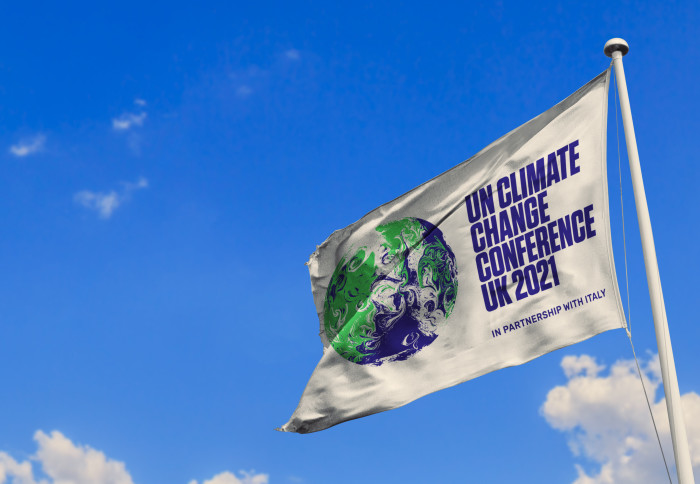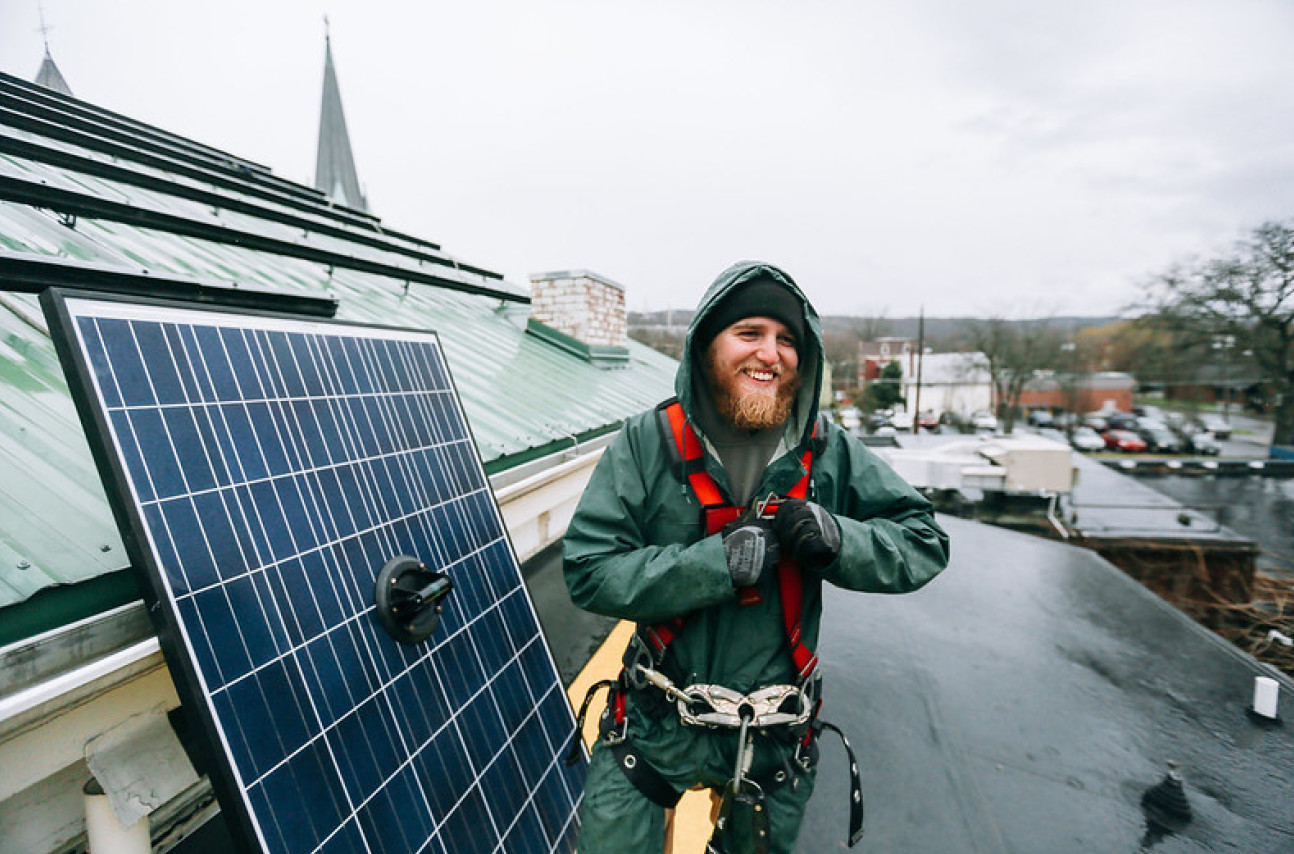Imperial shapes its role in the UN Climate Change Conference COP26

The whole Imperial community is invited to get involved in a year of action on climate change and biodiversity loss.
The UN Climate Change Conference (COP26) will be a landmark event where people and societies, businesses and governments commit to reducing carbon emissions and preventing irreversible damage to the planet.
The upcoming conference will be hosted by the United Kingdom government and held in Glasgow in November 2021. It marks a pivotal moment for the world’s nations to reinvigorate their targets for tackling climate change.
As one of the world’s leading universities with an established record of influencing national and international policy, Imperial College London has a vital role in ensuring the UK’s leadership of the summit is based on sound scientific evidence and strong research foundations.
Imperial is launching a programme for 2021 that will engage policymakers, businesses and the public to drive forward action on climate change and biodiversity loss. This will also involve its community of staff, students and alumni and will be led by the Grantham Institute – Climate Change and the Environment, one of the College’s Global Institutes.
Members of the Imperial community who are interested in finding out more about COP26, such as being part of the activities described below, organising their own activities that raise awareness or tackle the climate challenge, or seeking support, can contact the Grantham Institute team at cop@imperial.ac.uk.
COP26 Universities Network
For Imperial, COP26 is a chance for us to step up and engage more with policymakers, our local community and the public at large to help us all tackle this urgent global challenge together. Alyssa Gilbert Director of Policy and Translation, Grantham Institute for Climate Change and the Environment
COP26 is the most important international climate negotiations since the Paris Agreement was signed by 189 countries in 2015, and it is seen by many experts as an opportunity to ensure that societies, businesses and governments commit to a zero-carbon future and a truly green and fair recovery from the COVID-19 pandemic that is disrupting economies globally.
Imperial has a lead role in the COP26 Universities Network, a growing group of more than 55 UK-based universities and research centres working together to accelerate real change. It has received support from the national funding agency to provide evidence and expertise to all at the conference – including governments and NGOs. The group also has plans to showcase green job opportunities and start-ups, and to help the public envisage the UK as a climate-resilient nation, with 'net zero' carbon emissions.
Alyssa Gilbert, Director of Policy and Translation at the Grantham Institute, says: “It’s really exciting that the UK is the President of the climate change negotiations this year, at COP26. Imperial is delighted to be working with the other members of the COP26 Universities Network. COP26 is a vital opportunity for Imperial and the other network members to share our evidence on how to tackle climate change with the public, our leaders, and the international community to deliver genuine climate action and push for greater global ambition. For Imperial, it is a chance for us to step up and engage more with policymakers, our local community and the public at large to help us all tackle this urgent global challenge together.”
The COP26 Universities Network is also organising Climate Exp0, its first conference. Climate Exp0 will take place on 17 – 21 May 2021 and you can join the mailing list on the website to be notified when registration opens.
Briefing papers
Briefing papers that address the key issues on the negotiating table are one of the core contributions the network is making to the COP26 conference, distilling key messages for policymakers from distinguished academic experts based at the member universities.
The first briefing from the COP26 Universities Network identifies most promising green recovery policies that the government could introduce as the world emerges from the crisis of COVID-19. These will have a highly significant impact on the UK’s future prosperity, including its potential to meet its legally mandated net zero emissions obligation by 2050.

The briefing was written collaboratively by researchers from seven universities, including two authors from Imperial, Dr Charles Donovan from Imperial College Business School and Dr Ajay Gambhir from the Grantham Institute.
Another briefing from the COP26 Universities Network looks at how carbon offsetting can help UK further and higher education institutions achieve net zero emissions. Imperial's Dr Neil Jennings and Emily Lewis-Brown, a research postgraduate on the Science and Solutions for a Changing Planet DTP PhD programme, jointly authored the briefing together with academics from five other universities and the EAUC, the Alliance for Sustainability Leadership in Education.
An upcoming briefing paper from the Grantham Institute and the Energy Futures Lab will ask what the next steps are for technologies to deliver a zero carbon, resilient world, with a focus on challenges in the transport sector.
Podcast
The Climate Papers podcast series further explores the topics outlined in the COP26 University Network briefing papers. The first podcast, released on 27 January 2021, discusses the ten calls for action outlined in the network’s briefing paper ‘A net-zero emissions economic recovery from COVID-19’, which include reducing industrial emissions, investing in nature-based solutions and green home renovations and retrofits of energy systems. A new podcast will be released every two weeks.
You can listen to the podcast series here.

Mobilising Imperial's expertise
Climate change is a broad topic, and the negotiations at COP26 will only touch upon some of the issues that Imperial are working on. Hear our experts explain why their research, innovation and solutions matter in terms of solving the challenges of climate change.
- Dr Oytun Babacan, whose research revolves around low-carbon technologies, discusses how to integrate them into existing infrastructure.
- Naveed Chaudhry, who works with start-ups and entrepreneurs, speaks about how innovation can help create a cleaner, greener future;
- Dr Ana Mijic, an engineer with expertise in water, talks about the importance of introducing nature to urban areas;
- Dr Madeleine Morris discusses her research on the policy and regulation of the energy system;
- Dr Mirabelle Muûls, who investigates the economics of climate change, explores the impact of climate change on businesses;
- Dr Joeri Rogelj, who models future pathways to a zero-carbon future, explains how the UK government can ramp up its ambitions and how the world can actually achieve the targets set in the Paris Agreement;
- Dr Bonnie Waring, a life scientist who specialises in trees and soil, explains the role of nature-based solutions including tree planting.
You can watch two of the videos below, with Dr Gbemi Oluleye, who examines cutting carbon emissions in industry through the use of new technologies, and Dr Billy Wu, who explores the use of hydrogen and battery powered vehicles. Or you can watch the full set of videos.
Transition to Zero Pollution
Transition to Zero Pollution is one of the first initiatives of Imperial's new Academic Strategy. Its launch event in September 2020 featured a keynote speech from Mary Robinson, renowned global climate justice campaigner and former UN High Commissioner for Human Rights, where she urged guests to "re-design the future", lauding Transition to Zero Pollution as a "timely, valuable and holistic concept to guide policymakers" as the world tries to develop a viable and sustainable post-pandemic recovery.
I am enthused by the imagination and drive of the Zero Pollution initiative and have every confidence that Imperial will offer a propitious environment for this research to flourish. Mary Robinson Renowned global climate justice campaigner and former UN High Commissioner for Human Rights
The initiative captures Imperial's vision to transform the way we think about pollution, bringing together ideas around resource management, health and environmental impacts, socio-economic and human behaviour in a ‘whole system’ approach. It is widely recognised that this type of holistic approach is essential to enable successful action on climate change that also delivers on wider environmental goals and protects the most vulnerable from the impacts of climate change.
As part of the initiative, Imperial researchers will engage with policymakers on a range of science policy issues in the lead up to COP26, through roundtables, panel discussions and briefings. Topics will include environmental health, the circular economy (which designs out pollution and waste) and why taking a joined-up approach to global pollution will provide lasting solutions to this global challenge.
Education and skills
Delivering a net zero, resilient world will require new skills, and Imperial is committed to equipping our graduates for the future, as well as to offering courses to help re-skill the workforce.
Importantly, this year Grantham lecturers have built a pilot iSTEM course on climate change, one of several courses that all Imperial undergraduates complete to gain broader perspectives beyond their core degree.
Imperial offers a vast range of courses for postgraduates including two flagship courses: an MSc in Climate Change, Management and Finance and an MSC in Environmental Technology offered by our Centre for Environmental Technology. Graduates from these courses show excellent employability – indicating that these skills are truly in demand.
Climate change is a global challenge, and the Grantham Institute has also turned its hand to building knowledge and skills internationally. The Clean Power Program is an online course that focuses on the advantages of green energy and the practicalities to achieving this. Imperial’s Digital Academy is building further bespoke courses on clean power finance to smaller audiences in India and Indonesia.
Closer to home, Imperial’s Centre for Continuing Professional Development is soon to launch executive training on climate change with the Institute of Risk Management. These two half-day online seminars focus on the importance of managing climate change for organisations and how to do this. Find out more about the course on Climate Change Risk Management.
Finally, Imperial is set to offer learning opportunities to the public during London Climate Action Week and will be working with government to provide educational materials for further education and higher education students about climate change. COP26 offers a great opportunity for everyone in the UK to get involved!
Find out more
Find out more about Imperial and COP26 on the Grantham Institute's dedicated webpage.
Article text (excluding photos or graphics) © Imperial College London.
Photos and graphics subject to third party copyright used with permission or © Imperial College London.
Reporter
George Hope
Office of the President
Linsey Wynton
The Grantham Institute for Climate Change
